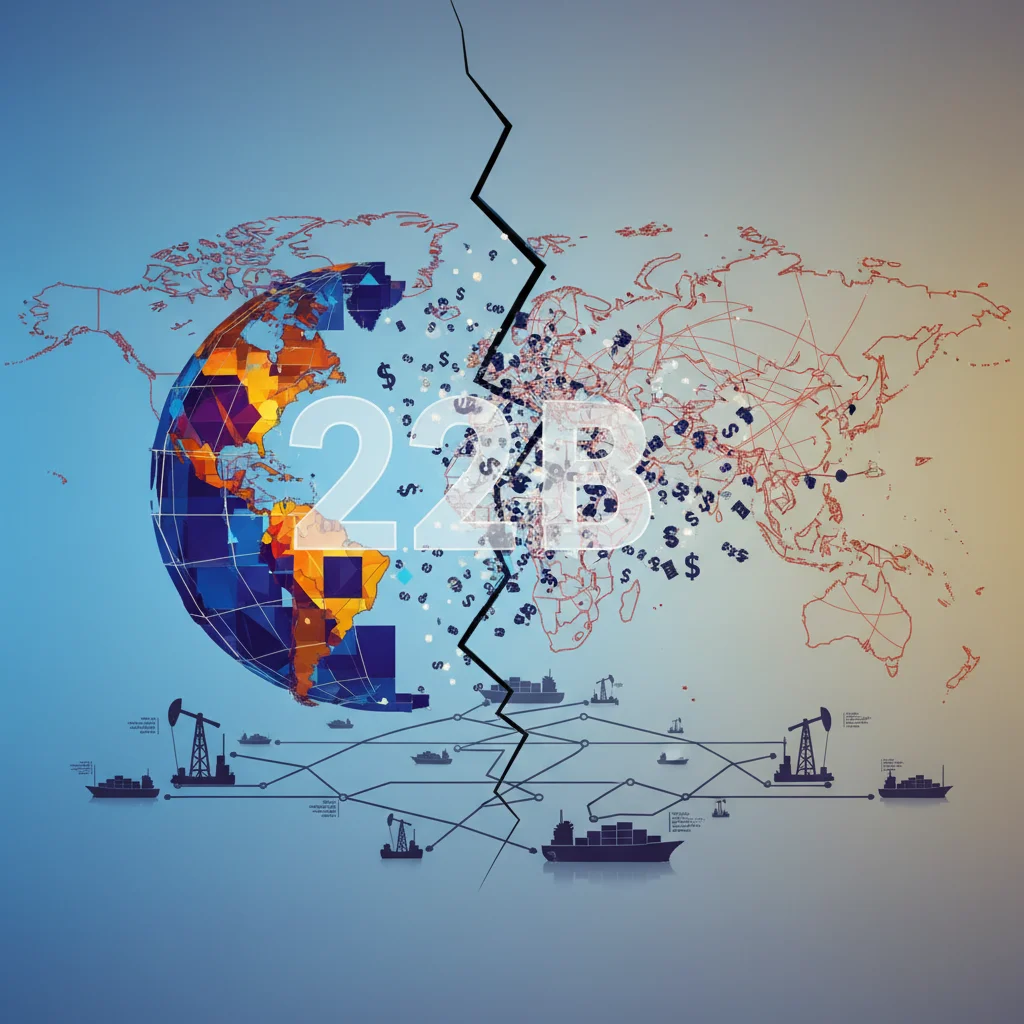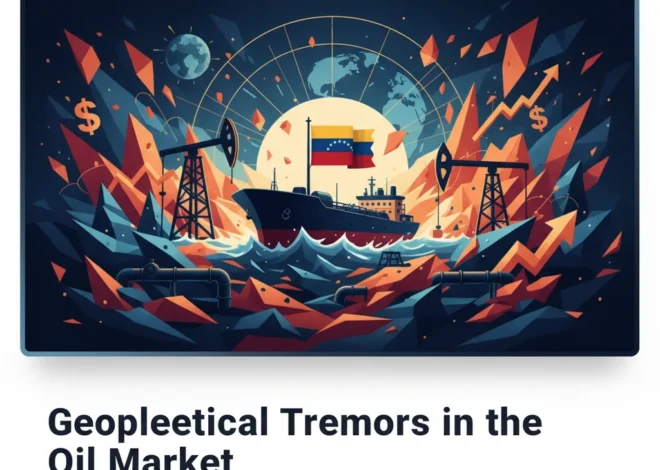
The $22 Billion Deal That Vanished: How Geopolitics Just Redrew the Map for Global Finance
In the high-stakes world of international commodity trading, deals are measured in billions and influence is measured in barrels. But what happens when a colossal $22 billion transaction collides with the unyielding force of geopolitics? We just found out. In a move that sent shockwaves through the global finance and energy sectors, Swiss trading giant Gunvor has abruptly abandoned its bid to acquire the international assets of Russian oil major Lukoil.
This wasn’t a failure of negotiation or a sudden change of heart based on market economics. It was a direct consequence of a stark warning from the United States Treasury, which reportedly labeled Gunvor a “Kremlin’s puppet” and threatened the one thing a global trader cannot survive without: its license to operate. This event is more than just a collapsed deal; it’s a defining case study in the modern fusion of finance, international relations, and corporate risk. For investors, finance professionals, and business leaders, the implications are profound and far-reaching, fundamentally altering the calculus of global investment and trading.
Deconstructing the Megadeal: Ambition Meets a Political Wall
To grasp the magnitude of this event, it’s crucial to understand the players and the prize. On one side, you have Gunvor Group, one of the world’s largest independent commodity traders, handling millions of barrels of crude oil and petroleum products daily. An acquisition of this scale would have dramatically expanded its global footprint, particularly in refining and logistics.
On the other side is Lukoil, a Russian multinational energy corporation. The assets in question were its international trading and refining operations—a sprawling network outside of Russia. For Lukoil, selling these assets would have been a strategic move to raise capital and insulate parts of its business from the ever-tightening net of Western sanctions.
The proposed $22 billion price tag underscored the strategic value of these assets. The deal represented a complex, high-reward maneuver in the intricate chess game of the global energy economy. However, the U.S. government saw the board differently.
The Treasury’s Decisive Intervention
The intervention from the U.S. Treasury was swift and severe. The threat wasn’t merely to block the transaction but to potentially revoke Gunvor’s operational licenses. For a company whose entire business model relies on access to the global financial system—which is overwhelmingly denominated in U.S. dollars—this is the corporate equivalent of a death sentence. The “Kremlin’s puppet” accusation, as reported by the Financial Times, was a clear signal that Washington viewed the deal not as a simple business transaction, but as an attempt to circumvent the economic pressure campaign against Russia.
This perception is rooted in Gunvor’s history. The company was co-founded by Gennady Timchenko, a Russian oligarch with close ties to the Kremlin who has been under U.S. sanctions since 2014. While Timchenko sold his stake in Gunvor just before the sanctions were imposed, the shadow of that association has proven difficult to escape. For the Treasury, any deal that could be perceived as enriching or enabling a sanctioned regime’s key industries was a non-starter.
This demonstrates the immense power of the U.S. Treasury’s Office of Foreign Assets Control (OFAC). Through its control over the dollar-based financial system, OFAC can exert enormous pressure on international corporations, regardless of where they are headquartered. This incident serves as a stark reminder that in today’s economy, compliance is not just a legal requirement; it is a license to exist.
The Future Is Tradable: How Crypto ETPs Are Making Bitcoin and Ethereum Investing Simple and Secure
The Ripple Effect: What This Means for Investing, Trading, and the Global Economy
The collapse of this single deal sends tremors across multiple domains, forcing a re-evaluation of risk and strategy for anyone operating on the global stage. The implications for the future of finance and economics are significant.
A New Paradigm for Commodity Trading
For commodity traders, the landscape has fundamentally shifted. The risk of secondary sanctions—where a non-U.S. entity is penalized for doing business with a sanctioned primary target—is no longer a theoretical threat but a clear and present danger. This will force a painful and costly re-evaluation of counterparty risk. Every link in the supply chain, from the origin of the commodity to the vessel it’s shipped on, will come under intense scrutiny. This heightened need for transparency and traceability could accelerate the adoption of new financial technology. We may see a greater push for `fintech` and `blockchain` solutions that can provide immutable, verifiable records of provenance to satisfy regulators.
Reassessing Political Risk in Investing
Investors and asset managers must now integrate sophisticated geopolitical analysis into their core investment theses. Traditional financial modeling is insufficient when a multi-billion-dollar asset can become worthless overnight due to a policy change. This elevates the importance of the ‘G’ in ESG (Environmental, Social, and Governance) investing. The “Governance” component now explicitly includes understanding a company’s ownership structure, political ties, and its vulnerability to sanctions. A company’s jurisdiction and its relationship with global powers are now critical risk factors that can impact its valuation on the `stock market`.
To help navigate this complex environment, professionals in finance and investing should consider a more structured approach to evaluating these non-financial risks. Below is a framework for assessing deals in this new geopolitical climate.
A Modern Framework for Geopolitical Due Diligence
| Risk Category | Key Questions for Investors & Business Leaders | Potential Mitigation Strategy |
|---|---|---|
| Sanctions Exposure (Direct & Indirect) | Is the target entity, its ultimate beneficial owners, or its key suppliers on any international sanctions list? Are they operating in a sanctioned sector? | Utilize advanced OFAC screening tools; engage specialized legal counsel for sanctions law; conduct deep-dive ownership tracing. |
| Political & Reputational Perception | How is the counterparty perceived by key governments (U.S., EU, UK)? What are its historical ties, even if they are no longer active? | Conduct media and political sentiment analysis; engage in proactive government relations; ensure transparent corporate communications. |
| Financial System Access | Does the deal rely heavily on access to U.S. dollar clearing or Western banking institutions? Could this access be jeopardized? | Diversify banking relationships; explore transactions in alternative currencies where feasible; maintain impeccable compliance records. |
| Supply Chain & Operational Interdependence | Is the target asset critically dependent on a politically volatile region for its operation or revenue? | Map the entire supply chain to identify vulnerabilities; develop contingency plans and alternative sourcing/market strategies. |
Impact on the Global Economy and Banking
On a macroeconomic scale, events like this can contribute to a fragmentation of the global economy. If major international players become hesitant to engage in cross-border M&A due to unpredictable political intervention, it could stifle capital flows and reduce economic efficiency. We may see the emergence of distinct economic blocs with their own financial systems and trading rules, creating a more complex and less integrated global `economy`.
For the `banking` sector, this increases the cost and complexity of compliance. Financial institutions are on the front lines of enforcing these policies, and the burden of “Know Your Customer” (KYC) and “Know Your Customer’s Customer” (KYCC) will only grow. This will likely drive further investment in regulatory technology (RegTech) to automate and improve the accuracy of compliance checks.
Conclusion: Navigating the Intersection of Commerce and Conflict
The collapse of the Gunvor-Lukoil deal is far more than a headline about a failed transaction. It is a landmark event that starkly illustrates the new rules of global commerce. The lines between economics, finance, and foreign policy have not just blurred; they have merged. For businesses and investors, the key takeaway is that geopolitical risk is no longer a peripheral concern to be managed by a specialized department. It is a central, strategic factor that can determine success or failure.
In this new era, resilience, transparency, and a profound understanding of the political landscape are as valuable as a strong balance sheet. The ability to navigate this complex intersection will be what separates the successful global players from those who, like Gunvor in this instance, find their ambitions checked by a force that no amount of capital can overcome.


